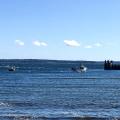New partnership will focus on 3D printing with wood products
Friday, May 3rd 2019

A new research collaboration between the University of Maine and the Department of Energy’s Oak Ridge National Laboratory in Tennessee will advance efforts to 3D print with wood products, creating a new market for Maine’s forest products industry.
A research team including people from both labs will work with the forest products industry to produce new bio-based materials that will be conducive to 3D printing a variety of products, such as boat hull molds, shelters, building components, tooling for composites and wind blades. They will also position the industry to print large, structurally demanding systems, such as boats.
The $20 million effort, funded by the Department of Energy’s Advanced Manufacturing Office, aims to strengthen regional manufacturing by connecting university–industry clusters with DOE’s Manufacturing Demonstration Facility at Oak Ridge Labs.
The partnership links two world-class research centers. Oak Ridge National Lab is a world leader in advanced manufacturing and is DOE’s largest science and energy laboratory. UMaine is a world leader in cellulose nano fiber (CNF) technology, including development of nano- and micro-cellulose reinforced thermoplastic composites through its Advanced Structures and Composites Center.
“The University of Maine is doing cutting-edge research related to bio-feedstocks and the application of advanced manufacturing in regional industries. We are thrilled at this opportunity to expand our research base while providing UMaine with access to the leading national capabilities we have developed at ORNL’s Manufacturing Demonstration Facility,” said Thomas Zacharia, director of Oak Ridge National Laboratory.
Last fall UMaine’s Advanced Structures and Composites Center received $500,000 from the Maine Technology Institute, which was matched by $500,000 from the U.S. Army Natick Soldier Research, Development & Engineering Center to form a technology cluster to help Maine boatbuilders explore how large-scale 3D printing using economical, wood-filled plastics can provide the industry with a competitive advantage. The cluster brought together the expertise of UMaine researchers and marine industry leaders to further develop and commercialize 3D printing, or additive manufacturing, to benefit boatbuilders in the state.
Small to medium boatbuilders are often challenged by the cost and lead time required to create traditional marine tools and boat molds. 3D printing can help reduce the production time needed to fabricate boat molds, by as much as 75 percent, according to researchers at the UMaine Composites Center. However, widespread adoption of large-scale additive manufacturing has been tempered by the high cost of the 3D printers and the cost of feedstock materials.
The collaboration with Oak Ridge will provide students, faculty and companies associated with UMaine’s Advanced Structures and Composites Center access to Oak Ridge lab’s assets and expertise in advanced manufacturing. Oak Ridge researchers, in turn, will gain access to UMaine’s facilities and expertise in CNF and composites.
Scientists from Oak Ridge and UMaine will conduct fundamental research in several key technical areas, including CNF production, drying, functionalization, and compounding with thermoplastics, multiscale modeling and sustainability life-cycle analysis. By placing CNF into plastics, strong, stiff, and recyclable bioderived material systems can be developed that may be 3D printed at deposition rates of hundreds of pounds per hour and up to 50 percent cellulose fiber loading. Printing with 50 percent wood promises to open new markets for the pulp, paper and forest products industries.
As a forest product, CNF could rival steel properties, and its successful incorporation into plastics shows great promise for a renewable feedstock suitable for additive manufacturing.
U.S. Senators Susan Collins (R-ME), Lamar Alexander (R-TN), and Angus King (I-ME) joined Daniel Simmons, the Assistant Secretary for Energy Efficiency and Renewable Energy at the U.S. Department of Energy, as well as leaders from UMaine and Oak Ridge in Washington, D.C., to announce the launch of the large-scale bio-based additive manufacturing program on May 2.
Senators Collins and King have been active in encouraging this type of collaboration between Maine’s forest products industry and leading researchers. In 2016, the Senators called on the U.S. Department of Commerce to form an economic development assessment team that would work across agencies and sectors to create strategies for job growth and economic development in Maine’s rural communities. The work of the EDAT led directly to this partnership.
















